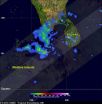Third US National Climate Assessment reports our ecosystems are already changing
Natural resources can help us adapt to extreme climate events
2014-05-07
(Press-News.org) The US Global Change Research Program released its Third National Climate Assessment (NCA) of the impacts of climate change on biodiversity and ecosystems this Tuesday, May 6. The NCA is the most comprehensive peer-reviewed analysis of climate change's impacts in the United States, informing Americans about the effects of climate change in their backyards.
"As an ecologist, you can't escape the effects of climate change on natural resources. We're observing climate impacts in nearly all natural and managed ecosystems," said Ecological Society of America President Jill Baron, an ecosystem scientist with the US Geological Survey in Fort Collins, Col., and a contributor to the NCA. "In order to protect biodiversity and the natural resources that we rely on, we need to be developing policy now. The National Climate Assessment provides guidelines for how to respond and adapt."
Our planet is already changing. Current climate trends are bringing great disruption to ecosystems and the many species that share this planet—including people, because this is our environment, our home, our life support system. The economic costs of wildfire, drought, storms, fishery losses to ocean acidity, and the inundation of our coastal cities by sea level rise are clear.
We depend on ecosystems for the pollination of our crops, the support of our fisheries, the cleanliness of our water—and the integrity of beloved wild areas enjoyed by fishers, hunters, hikers, and boaters.
Intact ecosystems improve soil, filter water, store carbon, and cycle nutrients. They buffer communities from urban heat waves, floods, erosion, and storm surge. Reefs, swamps, and coastal marshes, for example, help absorb the energy of big storms. Coastal development has denuded many of these protections, as was dramatically demonstrated in Superstorm Sandy's collision with New York City and the New Jersey coast in 2012.
"We know that ecosystems provide these benefits, but climate and other global changes are overwhelming their capacities to protect us," said Nancy Grimm, professor and Senior Sustainability Scientist at Arizona State University. "These ecosystems are threatened, not just from climate change, but from other changes that we have brought to them. We need to reverse that trend, understand these systems better, and think about how we can bolster their services to society."
Grimm, a past president of the Ecological Society, contributed to the third NCA. She guest edited a condensed and illustrated version of the biodiversity, ecosystems, and ecosystem services input to the NCA for a special open access issue of the society's journal Frontiers in Ecology and the Environment in November, 2013.
INFORMATION:
Find additional details and resources here.
Resources:
Third National Climate Assessment report, datasets, and tools (website)
Special Issue: Impacts of climate change on biodiversity, ecosystems, and ecosystem services. Frontiers in Ecology and the Environment 11(9) November, 2013 (open access). Summary.
SH Julius et al. Climate change and U.S. natural resources: advancing the nation's capability to adapt. Issues in Ecology, Fall 2013. (pdf)
The Ecological Society of America is the world's largest community of professional ecologists and a trusted source of ecological knowledge. ESA is committed to advancing the understanding of life on Earth. The 10,000 member Society publishes five journals, convenes an annual scientific conference, and broadly shares ecological information through policy and media outreach and education initiatives. Visit the ESA website at http://www.esa.org.
ELSE PRESS RELEASES FROM THIS DATE:
Breastfeeding promotes the growth of beneficial bacteria in the gut
2014-05-07
A number of studies have shown that breastfed babies grow slightly slower and are slightly slimmer than children who are fed with infant formula. Children who are breastfed also have a slightly lower incidence of obesity, allergies, diabetes and inflammatory bowel disease later in life. According to a new study by the National Food Institute and the University of Copenhagen this may be due to the fact that breastfeeding promotes the development of beneficial bacteria in the baby's gut.
"We have become increasingly aware of how crucially important a healthy gut microbial ...
Nanoscale heat flow predictions
2014-05-07
Physicists are now designing novel materials with physical properties tailored to meet specific energy consumption needs. Before these so-called materials-by-design can be applied, it is essential to understand their characteristics, such as heat flow. Now, a team of Italian physicists has developed a predictive theoretical model for heat flux in these materials, using atom-scale calculations. The research, carried out by Claudio Melis and colleagues from the University of Cagliary, Italy, is published in EPJ B. Their findings could have implications for optimising the ...
Researchers use DNA to build tool that may literally shine light on cancer
2014-05-07
Bioengineers at the University of Rome Tor Vergata and the University of Montreal have used DNA to develop a tool that detects and reacts to chemical changes caused by cancer cells and that may one day be used to deliver drugs to tumor cells.
The researchers' nanosensor measures pH variations at the nanoscale – how acidic (a higher pH level) or alkaline (a lower pH level) it is. Many biomolecules, such as enzymes and proteins, are strongly regulated by small pH changes. These changes affect in turn biological activities such as enzyme catalysis, protein assembly, membrane ...
Sleep researchers at SRI International identify promising new treatment for narcolepsy
2014-05-07
MENLO PARK, Calif.—May 7, 2014—Neuroscientists at SRI International have found that a form of baclofen, a drug used to treat muscle spasticity, works better at treating narcolepsy than the best drug currently available when tested in mice.
According to the National Institute of Neurological Disorders and Stroke (NINDS), narcolepsy, a chronic neurologic disorder characterized by excessive daytime sleepiness, is not a rare condition, but is under-recognized and under-diagnosed. It is estimated to impact 1 in 2,000 people worldwide.
In back-to-back papers published in ...
Argentina yields 3 new tarantula species
2014-05-07
A team of scientists from the Universidad de La República, Uruguay discovered three native to northern Argentina new species of the engaging spider group of the tarantulas. The study describing the newly found tarantulas was published in the open access journal ZooKeys.
The often hairy and very large spiders known as tarantulas are one of the most famous arachnid groups. Despite their ill fame as vicious killers most tarantulas are harmless to humans. Most tarantulas long lifespans, females can live between 15 and 30 years, which makes them a preferred pet for spider ...
A hydrogel that knows when to go
2014-05-07
HOUSTON – (May 7, 2014) – Rice University bioengineers have created a hydrogel that instantly turns from liquid to semisolid at close to body temperature – and then degrades at precisely the right pace.
The gel shows potential as a bioscaffold to support the regrowth of bone and other three-dimensional tissues in a patient's body using the patient's own cells to seed the process.
The hydrogel created in the lab of Rice bioengineer Antonios Mikos is a liquid at room temperature but, when injected into a patient, becomes a gel that would fill and stabilize a space while ...
NASA sees system 91B making landfall in southwestern India
2014-05-07
A tropical low was affecting southern India and Sri Lanka on May 6 at 0809 UTC when the Tropical Rainfall Measuring Mission satellite called TRMM flew above it. By May 7, System 91B moved over southwestern India and became less organized.
TRMM's Precipitation Radar revealed that rain was falling at a rate of 66 mm (2.6 inches) per hour in the stormy area south of India (5.2 north latitude and 77.1 east longitude). TRMM PR saw the tallest thunderstorm towers over Sri Lanka where heights were pushing to altitudes above 13 km (8 miles).
On May 7 at 12:30 UTC/8:30 a.m. ...
Perceived age and weight discrimination worse for health than perceived racism and sexism
2014-05-07
TALLAHASSEE, Fla. — Perceived age and weight discrimination, more than perceived race and sex discrimination, are linked to worse health in older adults, according to new research from the Florida State University College of Medicine.
The findings are part of a study measuring changes in health over a four-year period and published in the American Journal of Geriatric Psychiatry.
"Our previous research showed that perceived discrimination based on body weight was associated with risk of obesity. We wanted to see whether this association extended to other health indicators ...
Phytoplankton and zooplankton biomass will decrease 6 percent and 11 percent due to climate change
2014-05-07
Sea surface temperature is expected to increase 2 ºC on average globally by 2080-2100. Some of the consequences of this increase include changes in ocean circulation and higher water column stratification, thus affecting the nutrient availability for the growth of marine phytoplankton.
The research team led by Azti-Tecnalia points out the effects to primary production (phytoplankton mass produced annually by photosynthetic single-celled organisms that are suspended in the ocean), and to secondary production (zooplankton biomass, made up of small animal organisms that ...
National coordination needed to advance convergent research
2014-05-07
WASHINGTON -- Convergent research – which crosses disciplinary boundaries, integrating tools and knowledge from the life sciences, physical sciences, engineering, and other fields -- could spur innovation and help tackle societal challenges, but greater national coordination is needed, says a new report from the National Research Council. Convergent science still faces hurdles and requires a culture shift for research institutions, which have traditionally organized research around separate disciplines.
Convergent science also relies on forming a web of partnerships ...
LAST 30 PRESS RELEASES:
High‑performance all‑solid‑state magnesium-air rechargeable battery enabled by metal-free nanoporous graphene
Improving data science education using interest‑matched examples and hands‑on data exercises
Sparkling water helps keep minds sharp during long esports sessions
Drone LiDAR surveys of abandoned roads reveal long-term debris supply driving debris-flow hazards
UGA Bioinformatics doctoral student selected for AIBS and SURA public policy fellowship
Gut microbiome connected with heart disease precursor
Nitrous oxide, a product of fertilizer use, may harm some soil bacteria
FAU lands $4.5M US Air Force T-1A Jayhawk flight simulator
SimTac: A physics-based simulator for vision-based tactile sensing with biomorphic structures
Preparing students to deal with ‘reality shock’ in the workplace
Researchers develop beating, 3D-printed heart model for surgical practice
Black soldier fly larvae show promise for safe organic waste removal
People with COPD commonly misuse medications
How periodontitis-linked bacteria accelerate osteoporosis-like bone loss through the gut
Understanding how cells take up and use isolated ‘powerhouses’ to restore energy function
Ten-point plan to deliver climate education unveiled by experts
Team led by UC San Diego researchers selected for prestigious global cancer prize
Study: Reported crop yield gains from breeding may be overstated
Stem cells from human baby teeth show promise for treating cerebral palsy
Chimps’ love for crystals could help us understand our own ancestors’ fascination with these stones
Vaginal estrogen therapy not linked to cancer recurrence in survivors of endometrial cancer
How estrogen helps protect women from high blood pressure
Breaking the efficiency barrier: Researchers propose multi-stage solar system to harness the full spectrum
A new name, a new beginning: Building a green energy future together
From algorithms to atoms: How artificial intelligence is accelerating the discovery of next-generation energy materials
Loneliness linked to fear of embarrassment: teen research
New MOH–NUS Fellowship launched to strengthen everyday ethics in Singapore’s healthcare sector
Sungkyunkwan University researchers develop next-generation transparent electrode without rare metal indium
What's going on inside quantum computers?: New method simplifies process tomography
This ancient plant-eater had a twisted jaw and sideways-facing teeth
[Press-News.org] Third US National Climate Assessment reports our ecosystems are already changingNatural resources can help us adapt to extreme climate events



